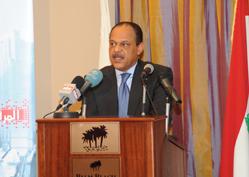
“The more we succeed in empowering Arab women, the greater is our progress towards sustainable human development”
With these words, ESCWA Executive Secretary Bader AlDafa summed up the vision that guides the Commission in its women-centered programs and activities, which have recently grown to include a TV program, entitled “Women in Economy”. The program is broadcasted on the Arab Woman Channel, and presented by Ghada Ballout Zeytoun.
“Women in Economy” is the first series of its kind that documents the work of female pioneers in the Arab region. The launch was also held under the auspices of the program’s High Committee President Randa Berri, the Secretaries General of sponsoring bodies and Lebanese Minister of Youth and Sports Ali Abdallah.
AlDafa said in the event organized for the occasion “ESCWA’s participation in the program is a clear expression of the role we want women to lead so all social groups can take part in the development process. The more we succeed in empowering Arab women, the greater is our progress towards sustainable human development.” He stressed that women’s participation in economic life represents a major axis for the United Nations. It is a foundation that emerges in frequent international events the world body has called for, be it the Beijing Summit (1995), the Millennium Summit (2000), the International Conference on Financing for Development (2002), or the World Summit (2005), where leaders from all over the globe reasserted their will to take major steps and find solutions to such dilemmas as peace, development, human rights, terrorism, environment, health and other pressing issues.”
AlDafa listed some issues that hinder women’s participation on the political and economic fronts, such as the limited access to land, property rights, and preferential loans. Moreover, women’s education is not linked to market needs, which means that specializations are not catering to the fields required in the market, like information and communication technologies.
He noted that the Fourth ESCWA Committee on Women recently adopted a resolution, which supports establishing an observatory for Arab women, and an early warning system that monitors and analyzes women-related social trends, eventually leading to averting social problems before escalation. The Committee is currently examining the possibility of hosting this observatory in Lebanon in cooperation with concerned governmental and non-governmental institutions. ESCWA places big emphasis on strengthening the economic participation of women in Arab countries. It also seeks to change the stereotypic image that media presents of Arab women. ESCWA gives high interest in its programs to women living in conflict zones and war-ridden countries such as Iraq, Lebanon, Palestine, Yemen and Sudan.
For her part, Berri spoke of the issues “Women in Economy” tackles, touching on the program’s importance and the goals it strives to achieve. These include a focus on integration, and the establishment of a yearly economic forum to deal with women’s issues and problems as a political and economic authority. “The launch of the program stems from the conviction in women’s role in facing up to development challenges on all levels. It also comes from the need for this role in socio-economic activities, and the need to invest in the great human potential in our societies, be it female or male. The program assert that women’s participation in social and economic activities is considered one of the main criteria in analyzing the progress and evolution of societies, especially from the angle of sustainable human development, itself based on building the capacities of individuals,” she said.
As for Abdallah, he stressed “the role of media and the effect it has on triggering women’s position in the economic field,” pointing out that media has transcended its traditional role and the concept of the fourth power, to become influential to the work of all authorities. “Those who run the media now control power,” he said.
The ceremony was attended by a group of political, diplomatic and economic figures. Also attending were activists in women issues, representatives of the media and the UN, heads of commercial, industrial and agricultural chambers, as well as civil society figures.





